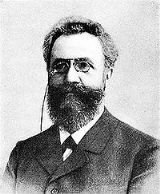
Hermann Ebbinghaus
Overview
Germany
Germany , officially the Federal Republic of Germany , is a federal parliamentary republic in Europe. The country consists of 16 states while the capital and largest city is Berlin. Germany covers an area of 357,021 km2 and has a largely temperate seasonal climate...
psychologist
Psychology
Psychology is the study of the mind and behavior. Its immediate goal is to understand individuals and groups by both establishing general principles and researching specific cases. For many, the ultimate goal of psychology is to benefit society...
who pioneered the experimental study of memory
Memory
In psychology, memory is an organism's ability to store, retain, and recall information and experiences. Traditional studies of memory began in the fields of philosophy, including techniques of artificially enhancing memory....
, and is known for his discovery of the forgetting curve
Forgetting curve
The forgetting curve hypothesizes the decline of memory retention in time. A related concept is the strength of memory that refers to the durability that memory traces in the brain. The stronger the memory, the longer period of time that a person is able to recall it...
and the spacing effect
Spacing effect
In psychology, the spacing effect refers to the fact that humans and animals more easily remember or learn items in a list when they are studied a few times over a long period of time , rather than studied repeatedly in a short period time .The phenomenon was first identified by Hermann Ebbinghaus;...
. He was also the first person to describe the learning curve
Learning curve
A learning curve is a graphical representation of the changing rate of learning for a given activity or tool. Typically, the increase in retention of information is sharpest after the initial attempts, and then gradually evens out, meaning that less and less new information is retained after each...
. He was the father of the eminent Neo-Kantian
Neo-Kantianism
Neo-Kantianism refers broadly to a revived type of philosophy along the lines of that laid down by Immanuel Kant in the 18th century, or more specifically by Schopenhauer's criticism of the Kantian philosophy in his work The World as Will and Representation , as well as by other post-Kantian...
philosopher Julius Ebbinghaus
Julius Ebbinghaus
Julius Ebbinghaus was a German philosopher, one of the closest followers of Immanuel Kant active in the twentieth century. He was influenced by the Heidelberg school of neo-Kantianism of Wilhelm Windelband, and wrote on philosophy of law and the categorical imperative...
.
Ebbinghaus was born in Barmen
Barmen
Barmen is a former industrial metropolis of the region of Bergisches Land, Germany, which in 1929 with four other towns was merged with the city of Wuppertal, North Rhine-Westphalia. Barmen was the birth-place of Friedrich Engels and together with the neighbouring town of Elberfeld founded the...
, Germany, the son of a wealthy Lutheran merchant. At the age of 17, he began attending the University of Bonn
University of Bonn
The University of Bonn is a public research university located in Bonn, Germany. Founded in its present form in 1818, as the linear successor of earlier academic institutions, the University of Bonn is today one of the leading universities in Germany. The University of Bonn offers a large number...
, where he had planned to study history
History
History is the discovery, collection, organization, and presentation of information about past events. History can also mean the period of time after writing was invented. Scholars who write about history are called historians...
and philosophy
Philosophy
Philosophy is the study of general and fundamental problems, such as those connected with existence, knowledge, values, reason, mind, and language. Philosophy is distinguished from other ways of addressing such problems by its critical, generally systematic approach and its reliance on rational...
.
Unanswered Questions

